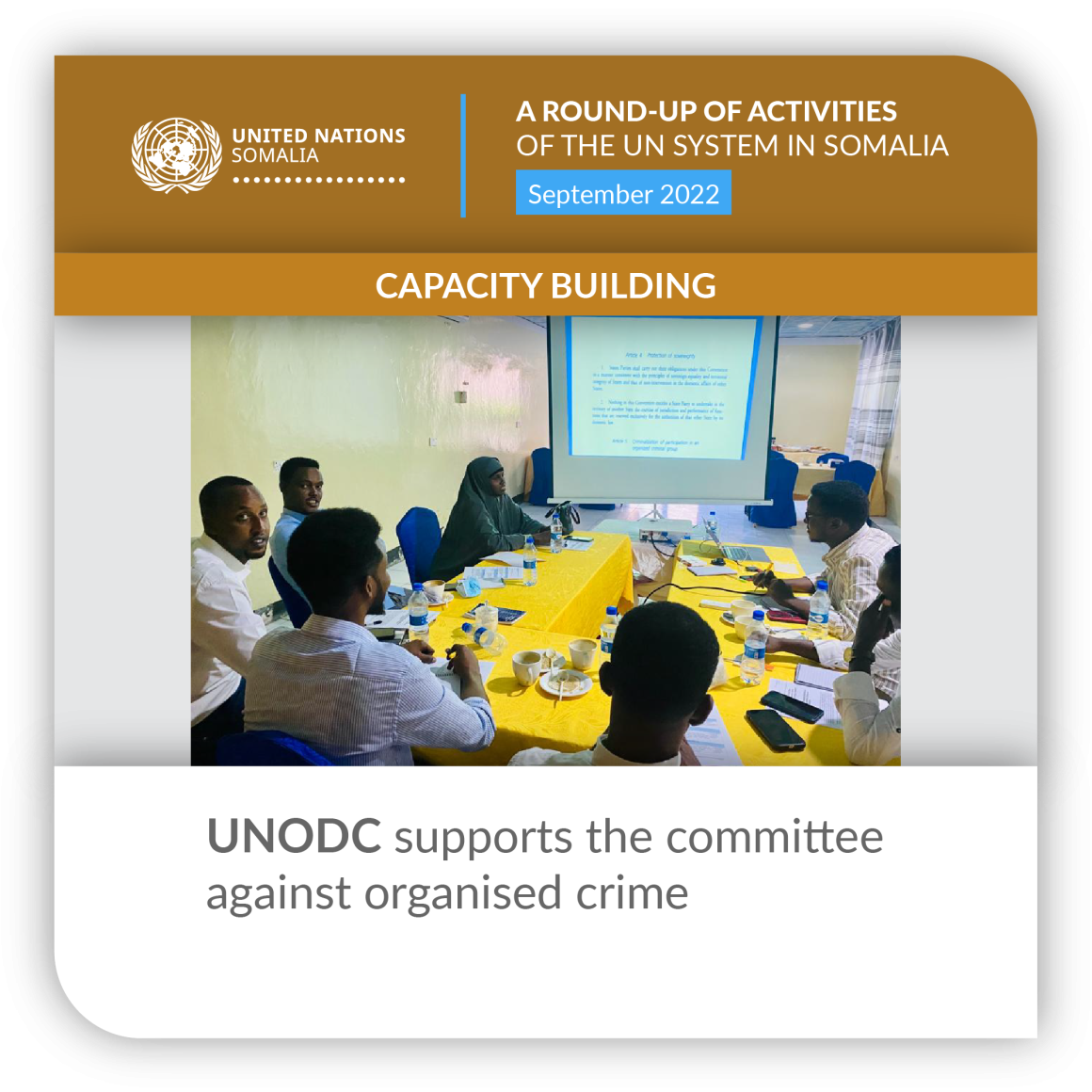 | Capacity building | UNODC supports the committee against organised crime Somalia is one of the few remaining countries to sign the United Nations Convention against Transnational Organised Crime (UNTOC). UNTOC is an instrument representing a major step forward in the fight against organised crime. As part of the commitment, a steering committee with expert knowledge of UNTOC has been created to assist in implementing a series of measures. These include establishing criminal offences, strengthening the capacity of law enforcement and law practitioners, and ensuring mutual legal assistance and law enforcement cooperation among the state signatories of UNTOC. The United Nations Office on Drugs and Crime (UNODC) is supporting Somalia every step of the way, most recently with a translation workshop of UNTOC from English to Somali, an awareness-raising workshop on UNTOC, and a regional UNTOC workshop in Uganda, where the Somalia steering committee members participated. | |
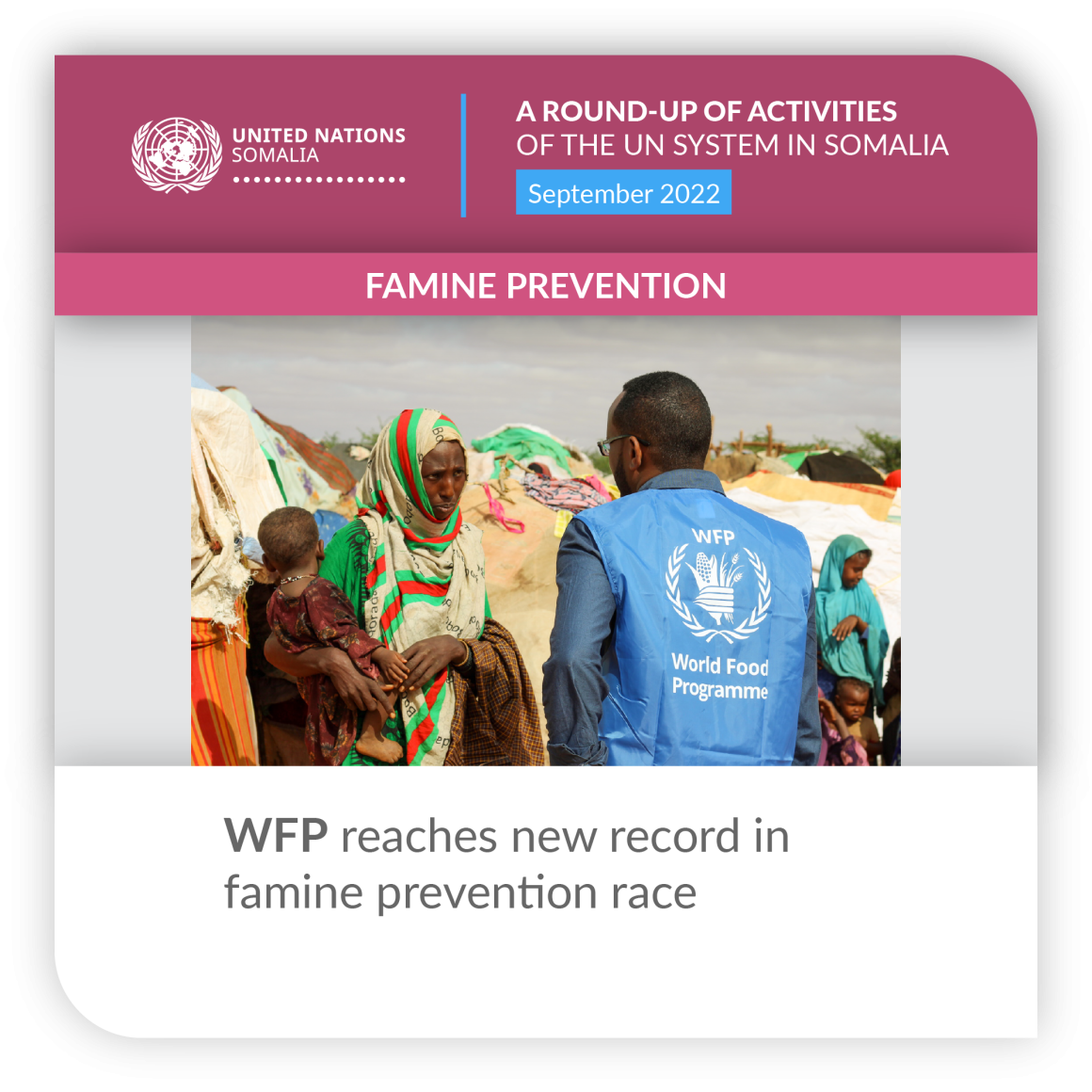 | Famine prevention | WFP reaches new record in famine prevention race The UN World Food Programme (WFP) reached another record high in its continuing scale-up of humanitarian response, racing against time to avert projected famine. From the start of September, the organisation was delivering life-saving food and nutrition to 4.9 million people, the largest number ever reached by WFP in Somalia. WFP has also continued to work with the Government, sister UN agencies and other partners to push further into the hunger hotspots where access to food remains a challenge - including areas of rural Baidoa and Burhakaba, where the threat of famine is most immediate. | |
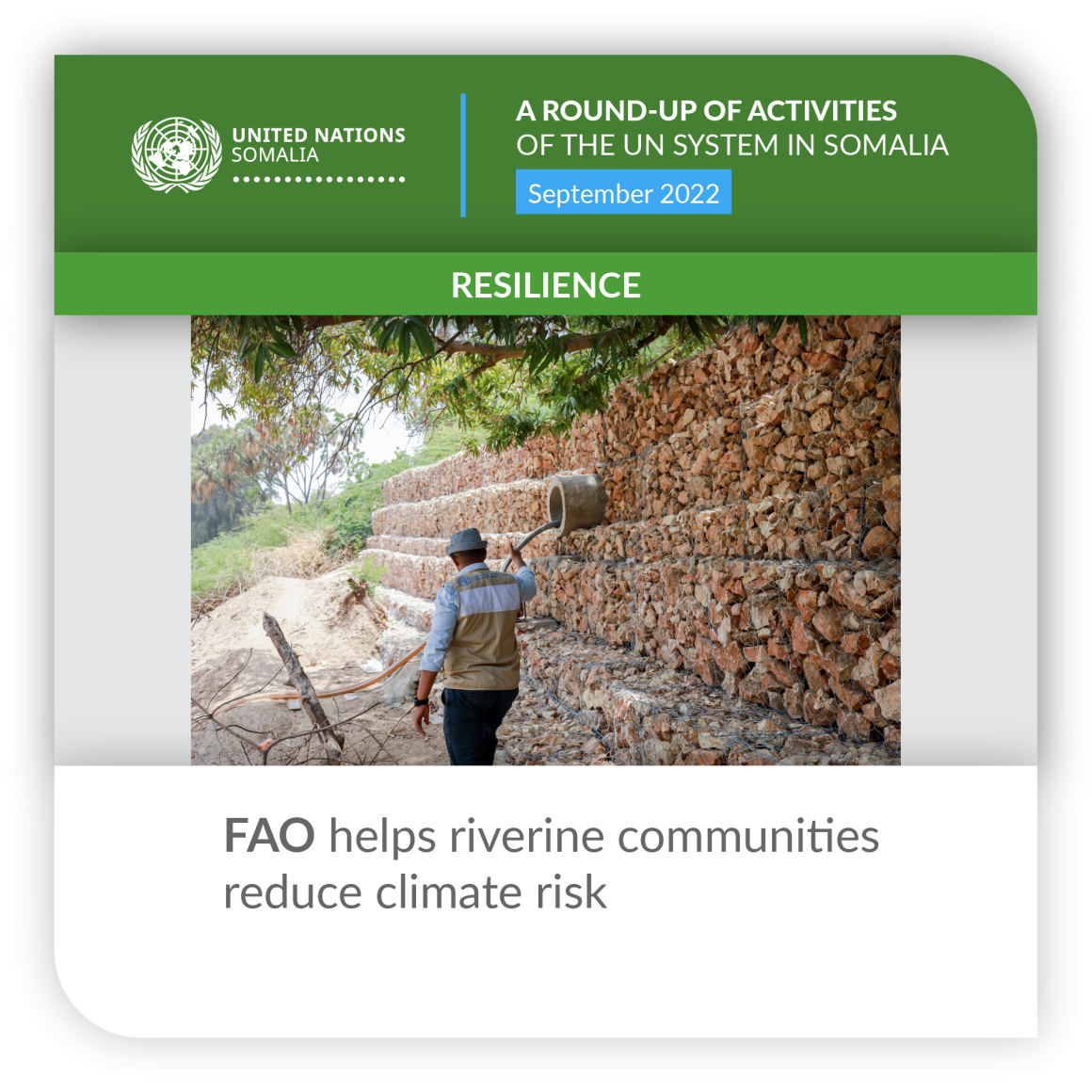 | Resilience | Rural farmers and agropastoralists have been some of the hardest hit by the impacts of climate change. Riverine communities along the riverbanks are often displaced by floods when it rains. Rural farmers and agropastoralists have been some of the hardest hit by the impacts of climate change. Riverine communities along the riverbanks are often displaced by floods when it rains. To reduce these risks, the Food and Agriculture Organisation (FAO) is supporting the Somali government to build infrastructure, manage climate data and create a policy to protect livelihoods through the project “Sustainable flood management and risk reduction action.” The project is helping reduce humanitarian risk to riverine communities through a climate and ecosystems approach to water and flood management, thanks to the support from the UK government. FAO successfully constructed flooding mitigation infrastructure in the Shebelle River, promoted climate adaptation to local communities in Beletweyne and established the National Flood and Drought Task Force. | |
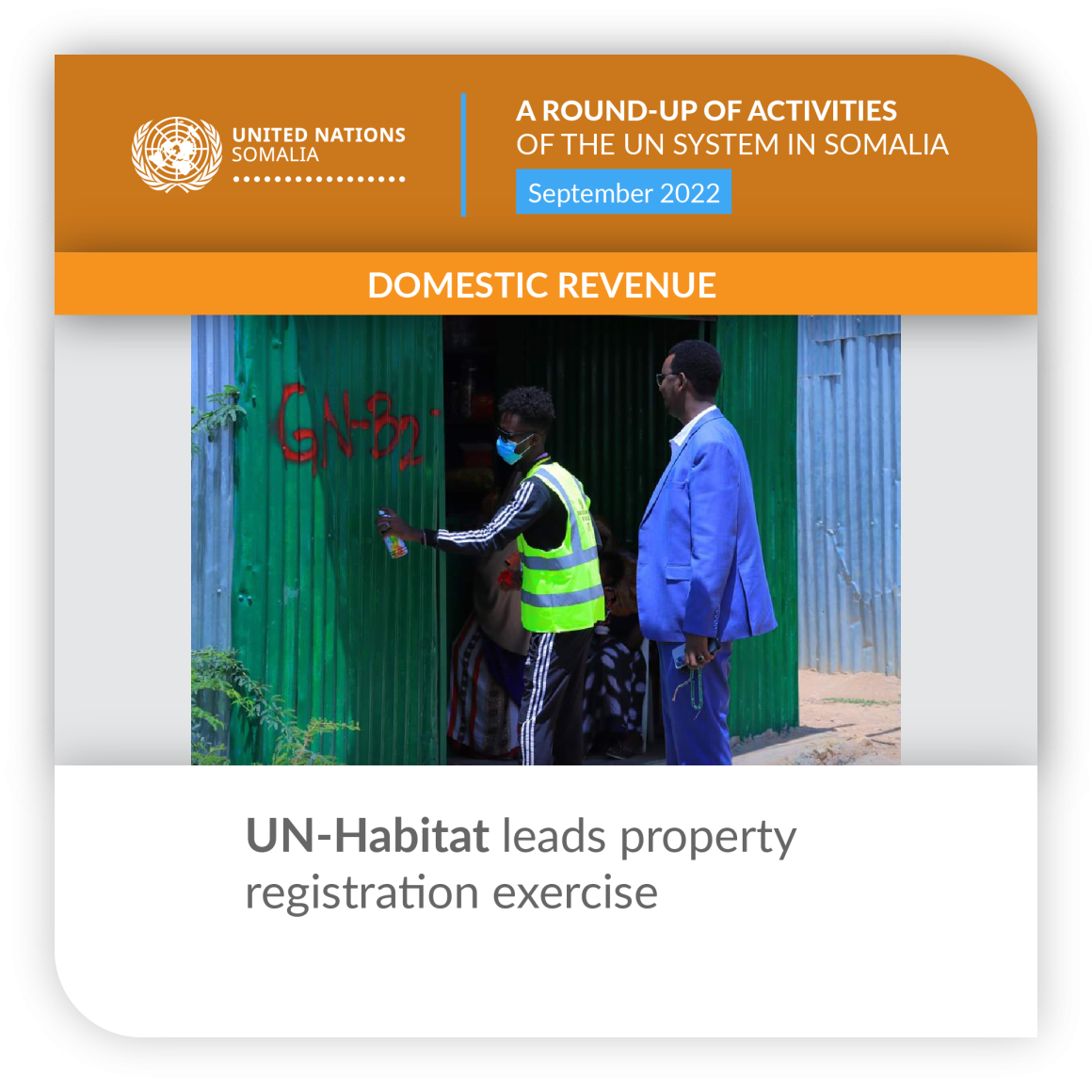 | Domestic revenue | UN-Habitat leads property registration exercise UN-Habitat, in a bid to support domestic resource mobilisation and strengthen local administrations, conducted a property registration exercise in the districts of Bosaso and Gardo in Puntland, Somalia. These districts, some of the largest in Puntland, have been experiencing increased urbanisation with new properties coming up. The enumerators updated the property database, registered new properties and labelled 37, 238 properties with plate numbers. With an estimated 60 per cent compliance rate, these districts expect to double the revenue from property taxation. Similar property registration exercises are being undertaken in Somaliland, with 8,500 properties registered so far in Gabiley. | |
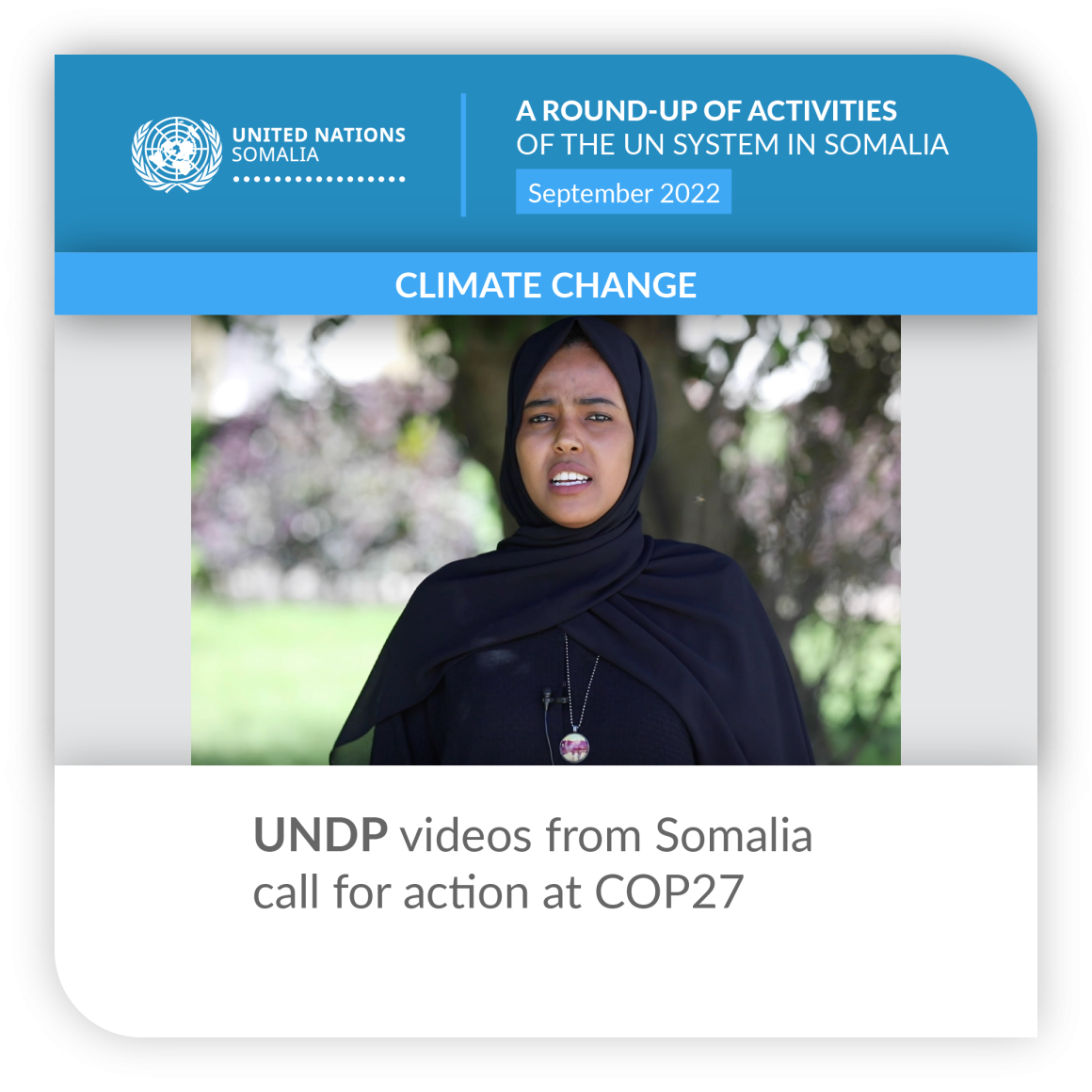 | Climate Change | UNDP videos from Somalia call for action at COP27 The United Nations Development Programme (UNDP) has produced a series of videos featuring Somalis from various backgrounds for COP27 taking place in Egypt this November. Through the videos, voices from countries most affected by climate change will be heard at this key summit as a call for action to tackle the climate emergency. The videos come, among others, from journalists, activists and environmentalists, and focus on the impact of climate change on Somalia and what people want to see being done. UNDP will also support the Somali government delegation to take part in high-level events of COP27. | |
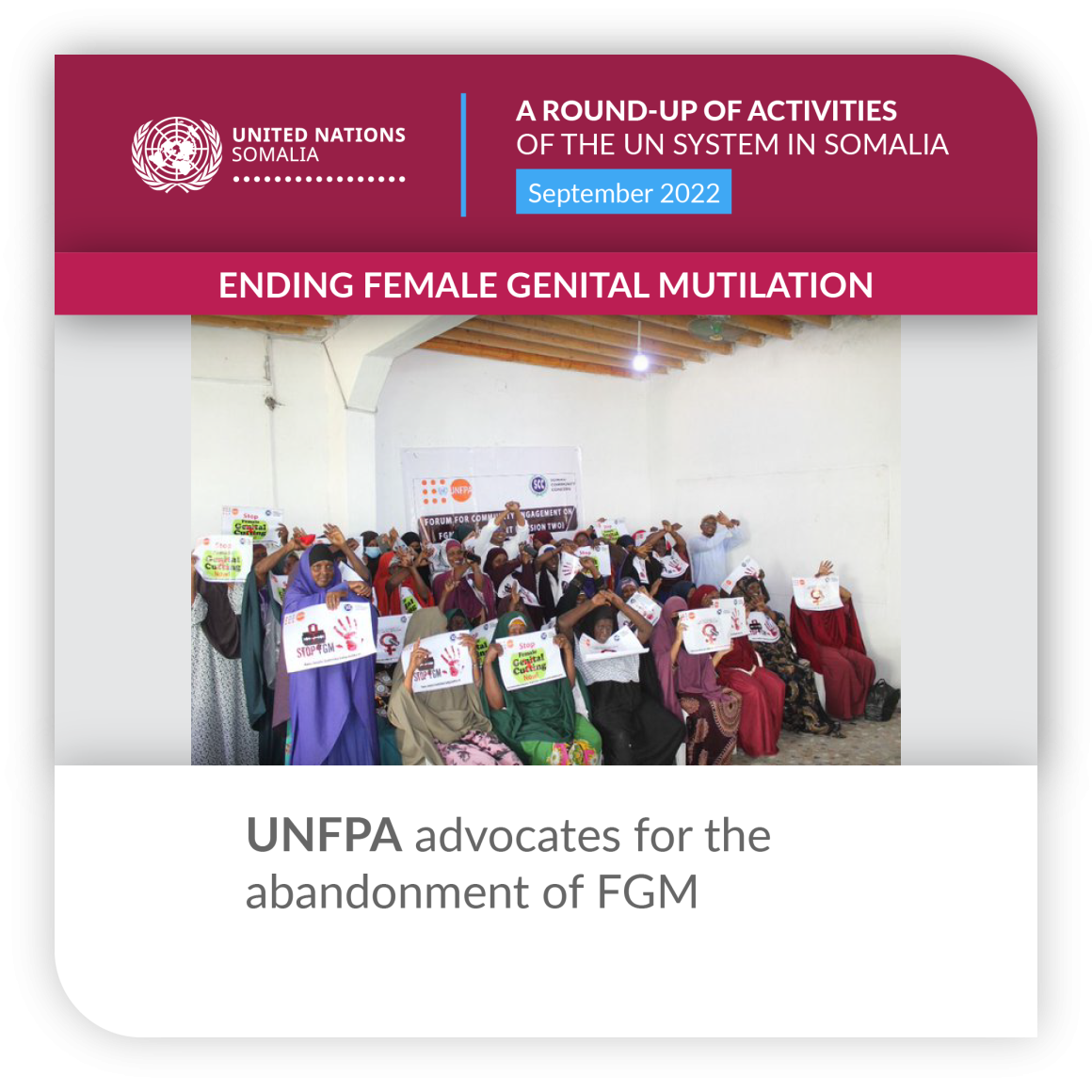 | Ending Female genital mutilation | UNFPA advocates for the abandonment of FGM We have abandoned FGM! – this is a unanimous declaration by 16 communities in Kahda and Deynile districts in the Benadir region. The communities were represented by 50 reformed cutters - traditional healers who used to perform FGM in the past. The declaration was made at a workshop organised by the United Nations Population Fund (UNFPA) and Somali Community Concern on 7 September. The reformed cutters also pledged to sensitise other traditional healers to abandon FGM. UNFPA campaigns against the medicalisation of FGM with a firm stance that FGM is neither “safe” nor has any medical justification. | |
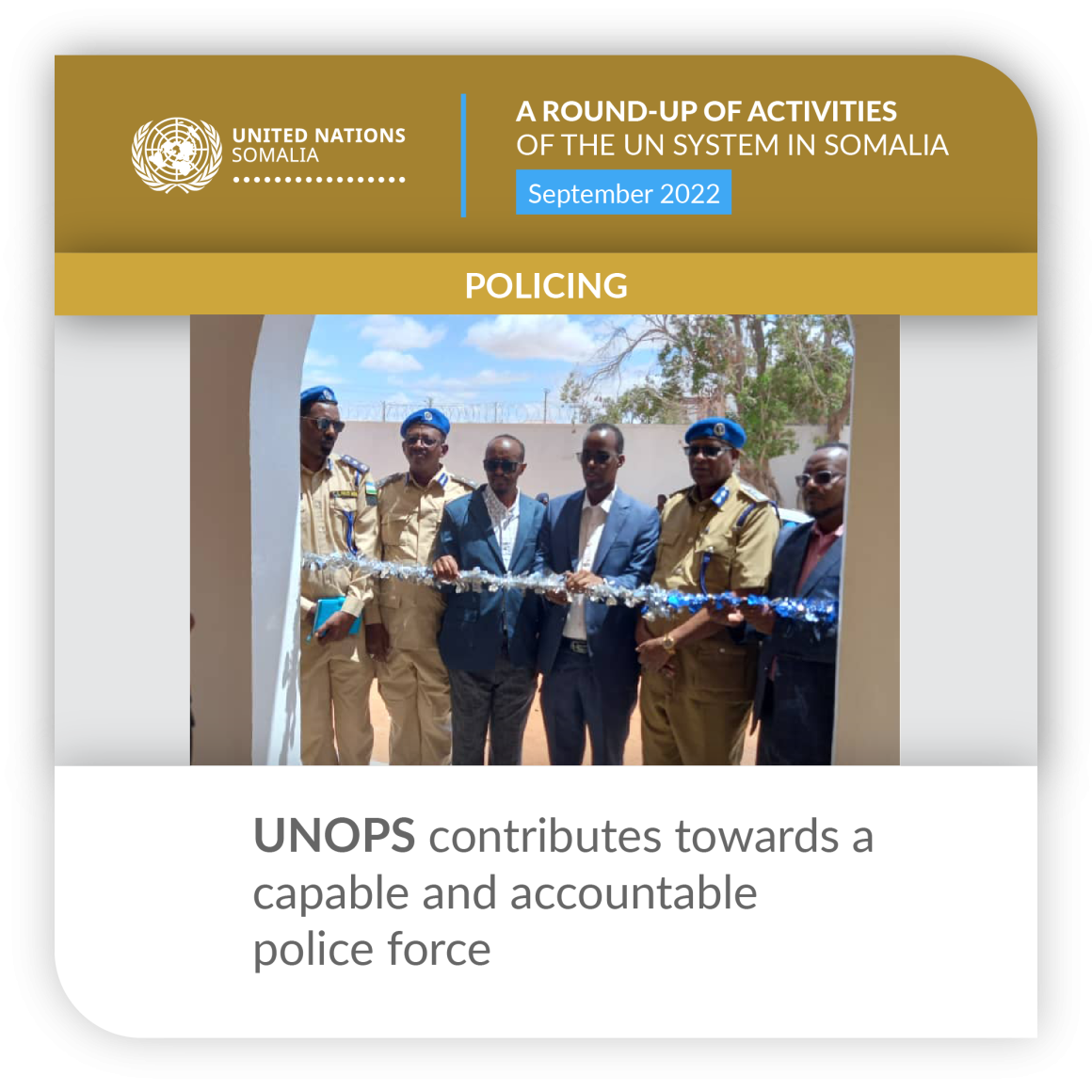 | Policing | UNOPS contributes towards a capable and accountable police force Through the Joint Police Programme (JPP), the United Nations Office for Project Services (UNOPS) is delivering on its commitment to build more police stations and outposts to bring policing services closer to the communities. On 19 September, JPP handed over the newly built Galkayo Central Police Station to the Puntland Police Force. The handover ceremony was attended by the Deputy Minister and Director General of the Puntland Ministry of Internal Security, as well as the Deputy Mayor and the Police Commissioners of Galkayo. The handover of the Galkayo police station follows the opening of six other police stations across Somalia out of the 17 that are scheduled to be delivered by the JPP in 2022. | |
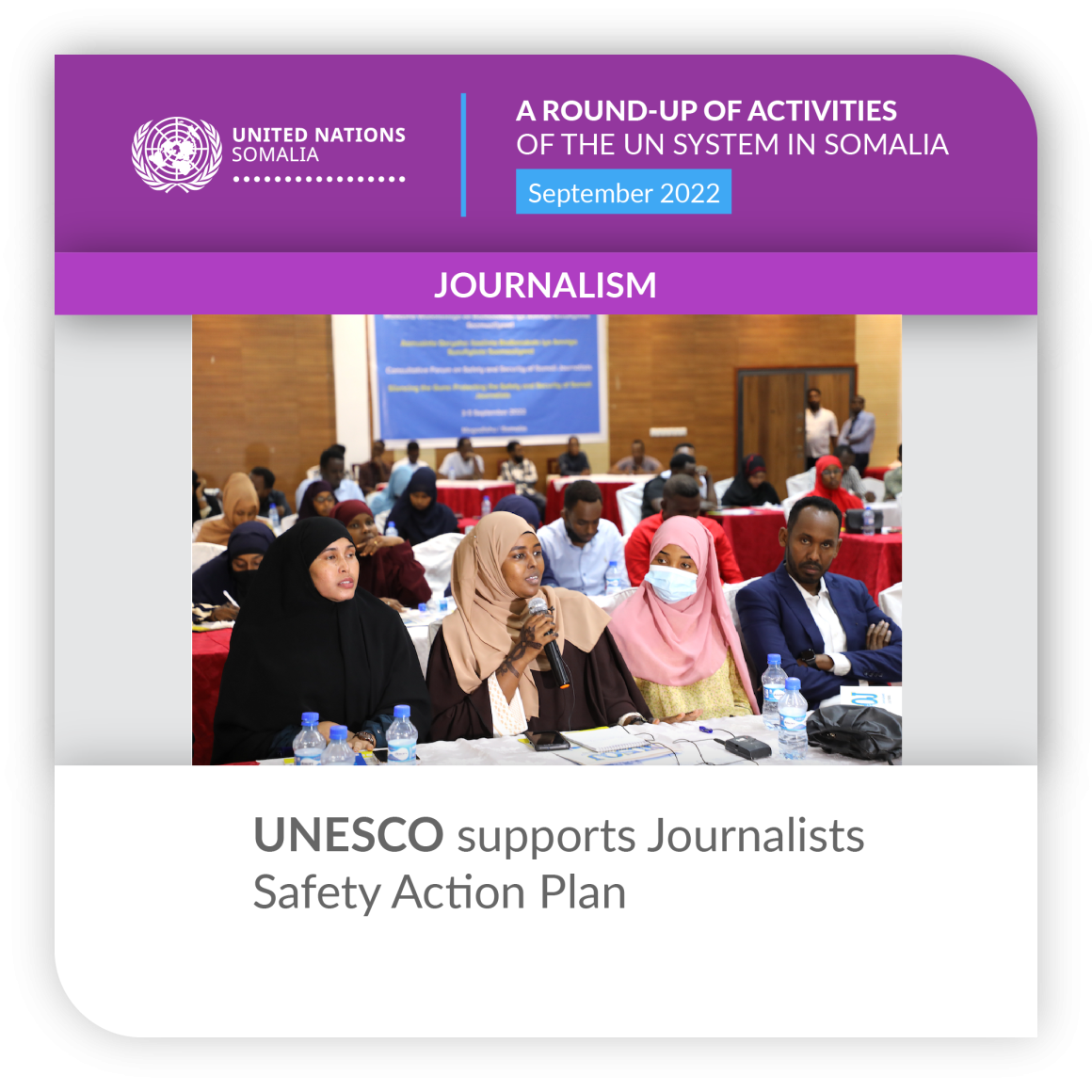 | Journalism | UNESCO supports Journalists' Safety Action Plan Today Somalia is still categorised as one of the most dangerous countries in the world for journalists, with the record of 52 journalists killed in the country over the last decade, according to the National Union of Somali Journalists (NUSOJ). Under the African Union initiative “Silencing the Guns,” the United Nations Educational, Scientific and Cultural Organization (UNESCO) supported a three-day Consultative Forum on Safety and Security of Somali Journalists to discuss ending the spiral of violence and impunity in targeting journalists in Somalia. Participants addressed pressing occupational safety and security issues and discussed the unique safety challenges facing female journalists, who, in addition to risks they share with their male counterparts, also face gender-based abuses. | |
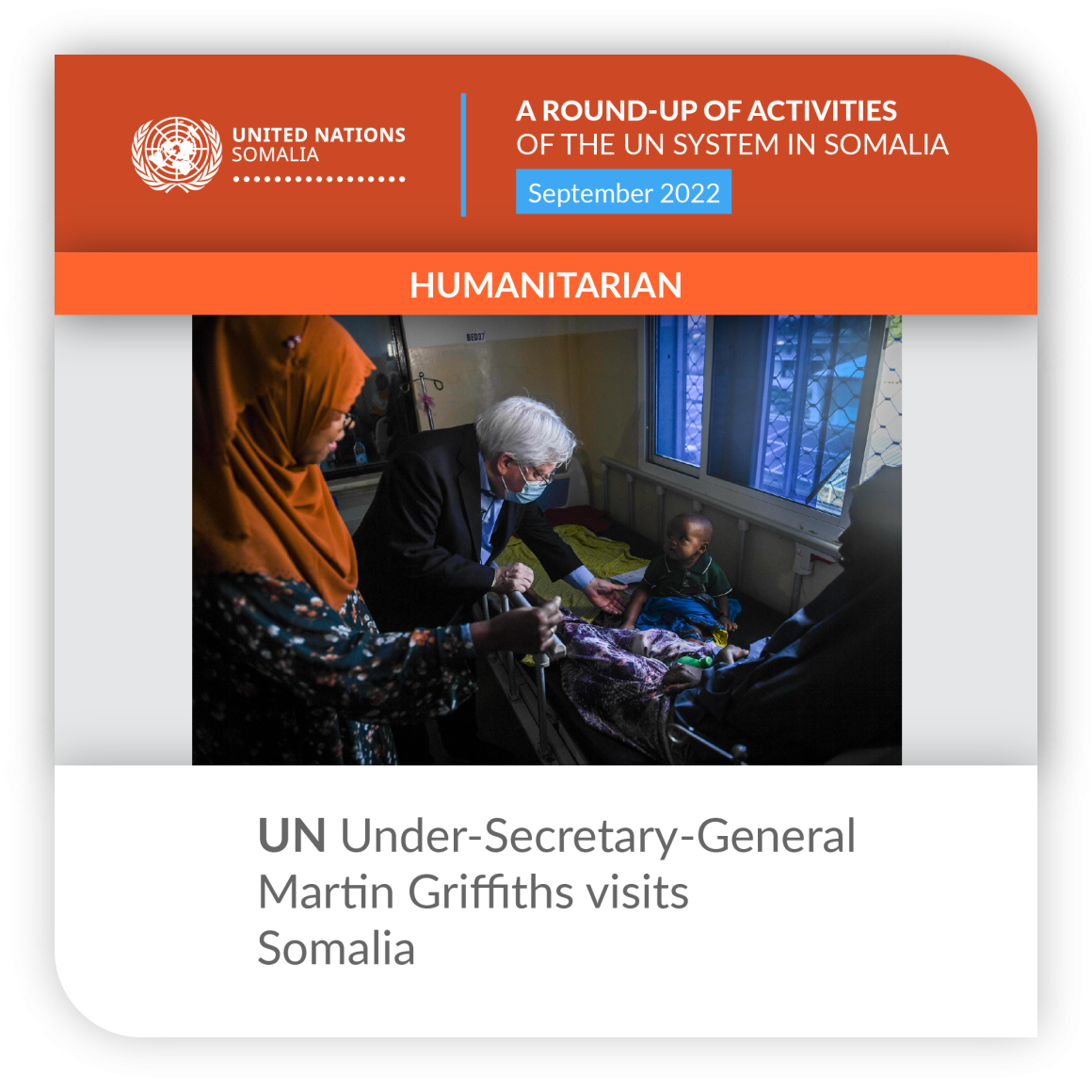 | Humanitarian | UN Under-Secretary-General Martin Griffiths visits Somalia The United Nations Office for the Coordination of Humanitarian Affairs (OCHA) facilitated a seven-day visit of the UN Under-Secretary-General for Humanitarian Affairs and Emergency Relief Coordinator Martin Griffiths to Somalia. During his mission, the USG met with drought-displaced families in Baidoa and Banadir Hospital in Mogadishu, where he also met severely malnourished children. At a media briefing in Mogadishu on 5 September, the USG warned that there are concrete indications that famine will occur in Bay Region (Baidoa and Buur Hakaba districts) in South West State in the coming months if humanitarian assistance is not significantly ramped up to reach the people in most need. | |
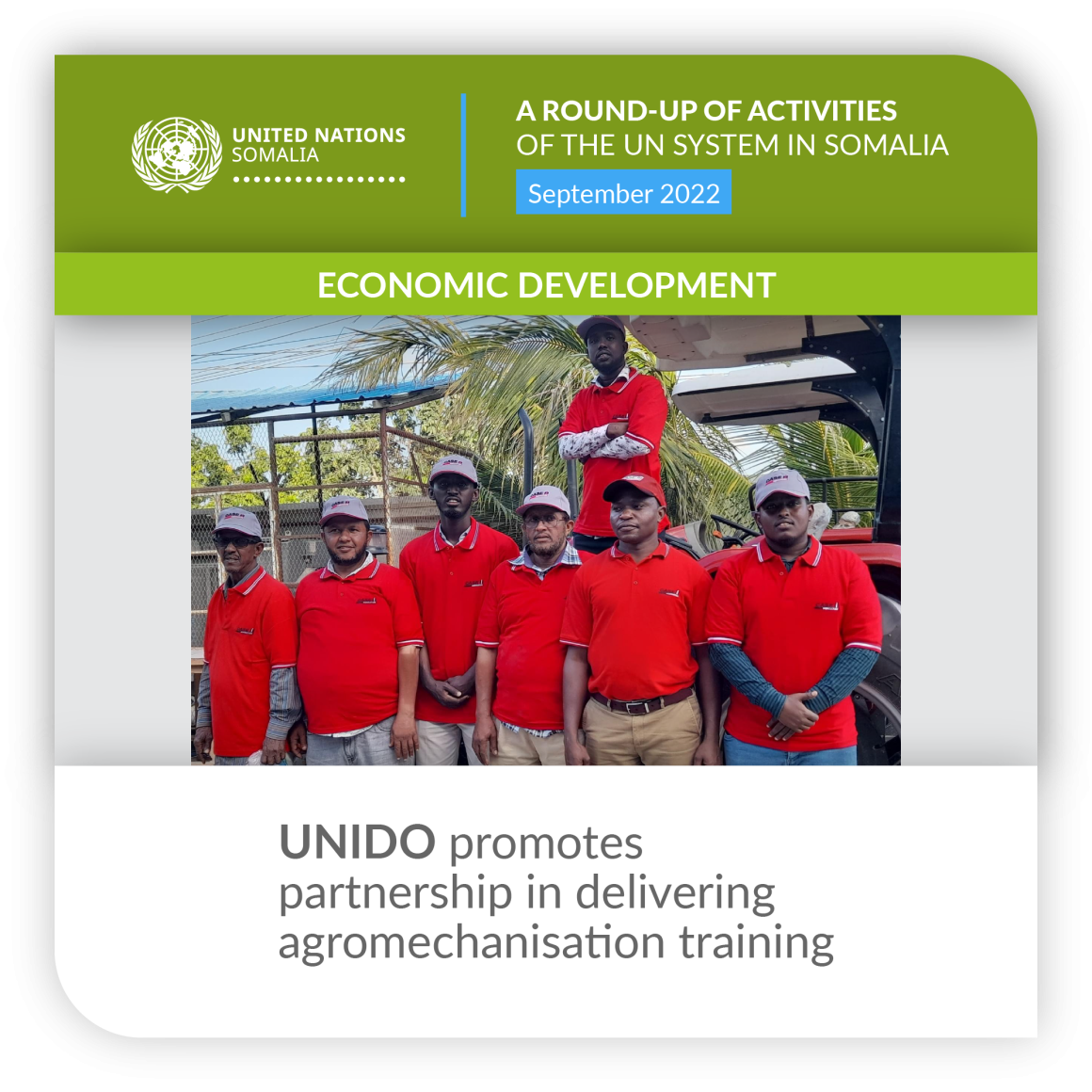 | Economic development | UNIDO promotes a partnership in delivering agromechanisation training In September, Gaalooge Agro-Business Enterprise based in Mogadishu, supported by CNH, an international agricultural machinery company, and the United Nations Industrial Development Organisation (UNIDO) commenced a master training in agromechanisation for local technicians. The sessions facilitated by a senior international technician from CNH responded to the demand for skilled agromechanics and tractor drivers in Somalia. The trained technicians are expected to transfer the skills and knowledge gained and skills to 40 trainees (32 Male and eight female). This training is a part of a broader initiative by the Gaalooge Technical and Vocational Education Training (TVET) School that will improve the skills of agricultural communities’, especially of women and families in Southern and Banaadir. The Gaalooge TVET School is jointly supported by UNIDO Somalia and CNH. | |
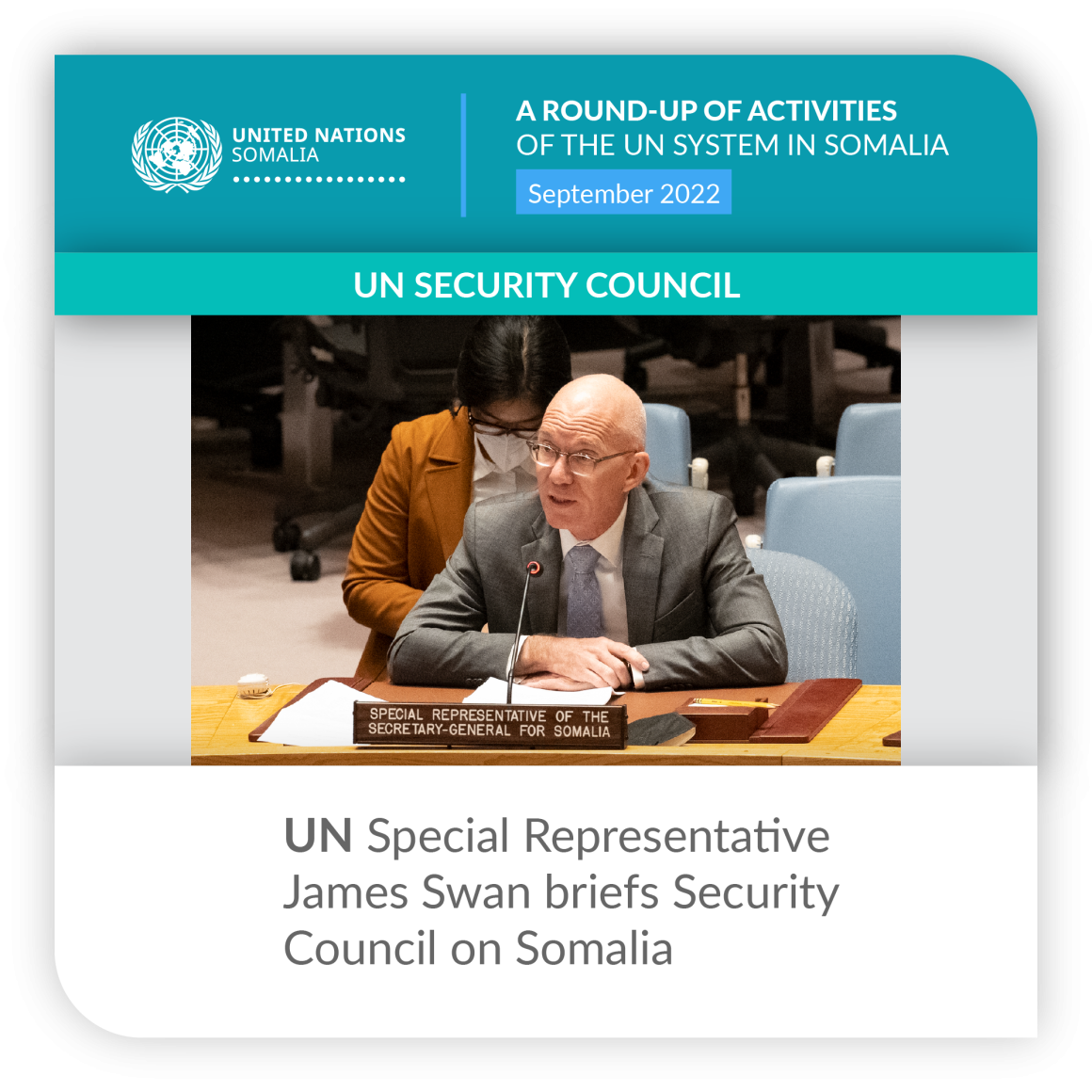 | Security Council │ UN Special Representative James Swan briefs Security Council on Somalia The UN Secretary-General’s Special Representative for Somalia, James Swan, briefed the UN Security Council on Somalia’s political, humanitarian and security situation on 7 September. Mr. Swan explained that, with the conclusion of the contentious electoral process in May, the political climate in Somalia was now more conducive to addressing key national priorities. These priorities included improving governance and justice, effectively countering Al-Shabaab, and responding urgently to the worsening humanitarian crisis. Mr. Swan warned that Somalia was facing a humanitarian catastrophe with some 7.8 million Somalis — nearly half of the country’s estimated population — impacted by the worst drought in at least four decades, exacerbated by climate factors. “With four consecutive failed rainy seasons, areas of the country face the risk of famine,” Mr. Swan said. The underrepresentation of women in parliament was also a concern, the UN official told Council members, adding that “I call again for Somali leaders to take further measures to ensure women’s meaningful participation across institutions of government, as well as the inclusion of youth and historically marginalised groups.” |
A round-up of activities of the UN system in Somalia in September 2022
- 01 October 2022
- Newsletters and Round-ups of UN Activities
- Top Stories






